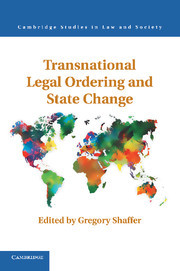Description
Transnational Legal Ordering and State Change
Cambridge Studies in Law and Society Series
Coordinator: Shaffer Gregory C.
Leading law and society scholars apply an empirically grounded approach to the study of transnational legal ordering and its effects within countries.
Language: English
Subject for Transnational Legal Ordering and State Change:
Transnational Legal Ordering and State Change
Publication date: 08-2014
Support: Print on demand
Publication date: 08-2014
Support: Print on demand
Transnational Legal Ordering and State Change
Publication date: 11-2012
264 p. · 15.7x23.6 cm · Hardback
Publication date: 11-2012
264 p. · 15.7x23.6 cm · Hardback
Description
/li>Contents
/li>Biography
/li>
Law can no longer be viewed through a purely national lens. Transnational legal ordering affects the boundary of the state and the market, the allocation of power among national institutions, the role of professions and their expertise, and associational patterns that provide new normative frames. This book breaks new ground for understanding the impacts of transnational legal ordering within nation-states in today's globalized world. The book addresses the different dimensions of state change at stake and the factors that determine these impacts. It brings together leading scholars from sociology and law who study the effects of transnational legal ordering within different countries. Their case studies illustrate how transnational legal ordering interacts with national law and institutions in different regulatory areas, and cover anti-money laundering, bankruptcy, competition, education, intellectual property, health, and municipal water law and policy in different countries. The book explains the extent and limits of transnational legal ordering in today's world.
1. Transnational legal ordering and state change Gregory Shaffer; 2. The dimensions and determinants of state change Gregory Shaffer; 3. Similar in their differences: transnational legal processes addressing money laundering in Brazil and Argentina Maira Machado; 4. Architects of the state: international organizations and the reconstruction of states in East Asia Terrence Halliday; 5. Neoliberalism, transnational education norms, and education spending in the developing world, 1983–2004 Minzee Kim and Elizabeth Boyle; 6. Access to medicines and the transformation of the South African state Heinz Klug; 7. The limits of transnational transformations of the state: comparative regulatory regimes in water services delivery Bronwen Morgan; 8. Conclusion: the study of transnational legal ordering Gregory Shaffer.
Gregory C. Shaffer is the Melvin C. Steen Professor of Law at the University of Minnesota Law School and Affiliated Professor in the Department of Political Science. His publications include Dispute Settlement at the WTO: The Developing Country Experience (2010), When Cooperation Fails: The International Law and Politics of Genetically Modified Foods (2009), Defending Interests: Public-Private Partnerships in WTO Litigation (2003), Transatlantic Governance in the Global Economy (with Mark Pollack, 2001) and more than seventy articles and book chapters.
© 2024 LAVOISIER S.A.S.




